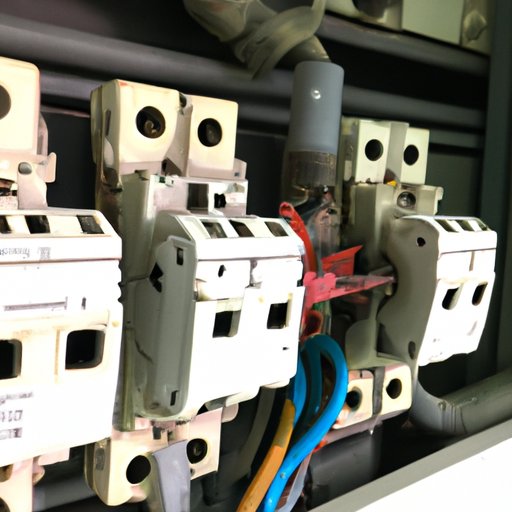Introduction
A tripped circuit breaker is one of the most common and frustrating electrical issues homeowners face. A circuit breaker is a device designed to protect an electrical circuit from overloading or shorting out. When a circuit breaker trips, it cuts off power to the circuit. This can be annoying, as it usually means turning off appliances and resetting breakers. But it is actually a sign that the circuit breaker is doing its job – preventing dangerous electrical conditions in your home.
In this article, we will explore why circuit breakers trip and what steps you can take to identify and fix the problem. We will also discuss electrical safety and how to prevent future trips by upgrading your home’s electrical system.

Investigating the Causes of Circuit Breaker Tripping
Before attempting to troubleshoot a tripped circuit breaker, it is important to identify any common electrical problems that may be causing it to trip. Some common causes include faulty wiring, overloaded circuits, and old or defective circuit breakers. If you cannot determine the cause of the trip, it is best to call a professional electrician for assistance.
How to Troubleshoot a Tripped Circuit Breaker
Once you have identified common electrical problems, you can begin troubleshooting your tripped circuit breaker. The first step is to check all circuit breakers and reset them if necessary. This will help determine which circuit is causing the issue. Then, inspect all appliances and cords connected to the circuit to make sure they are not damaged or defective. Finally, examine your home’s electrical system to check for any potential problems.

Electrical Safety: What to Do When Your Circuit Breaker Keeps Tripping
When your circuit breaker keeps tripping, it is important to follow certain safety guidelines. Unplug all electrical devices on the affected circuit and avoid overloading outlets. You should also consider installing ground-fault circuit interrupters (GFCIs) to protect against electrical shock.
Understanding Circuit Breakers and Why They Trip
It is important to understand the function of circuit breakers and why they trip. Circuit breakers are designed to protect your home’s electrical system from overloading or shorting out. There are two types of circuit breakers: single pole and double pole. Single pole circuit breakers are used for 120-volt circuits, while double pole circuit breakers are used for 240-volt circuits. Circuit breakers are designed to trip when they detect an overload or short circuit, thus protecting your home from a potentially dangerous situation.

Common Reasons for a Circuit Breaker Tripping
There are several common reasons why a circuit breaker may trip. One of the most common is an electrical overload. This occurs when too many appliances are plugged into a single circuit. Another common cause is faulty wiring, which can cause a short circuit. In some cases, an old or defective circuit breaker may be to blame. It is important to identify the root cause of the problem before attempting to fix it.
Preventing Circuit Breaker Trips by Upgrading Your Home’s Electrical System
Once you have identified and fixed the underlying cause of your circuit breaker trips, you can take steps to prevent future trips. One way to do this is to upgrade your home’s electrical panel. This will allow you to add more circuits and increase the capacity of your electrical system. You should also install GFCI outlets to protect against electrical shocks. Finally, you may need to add more circuits if your current system is unable to handle the load.
Conclusion
If your circuit breaker keeps tripping, it is important to investigate the cause and take steps to fix the problem. Identifying common electrical problems and knowing when to call a professional can help you troubleshoot the issue. Additionally, you can take steps to prevent future trips by upgrading your home’s electrical system. By understanding circuit breakers and their function, you can ensure your home’s electrical system is up-to-date and safe.
(Note: Is this article not meeting your expectations? Do you have knowledge or insights to share? Unlock new opportunities and expand your reach by joining our authors team. Click Registration to join us and share your expertise with our readers.)
